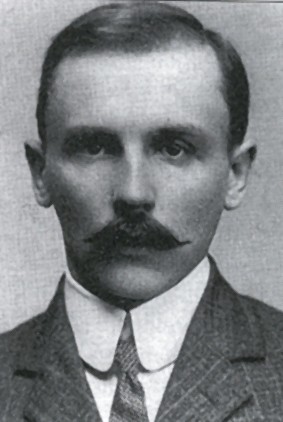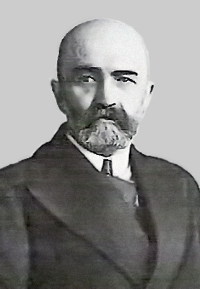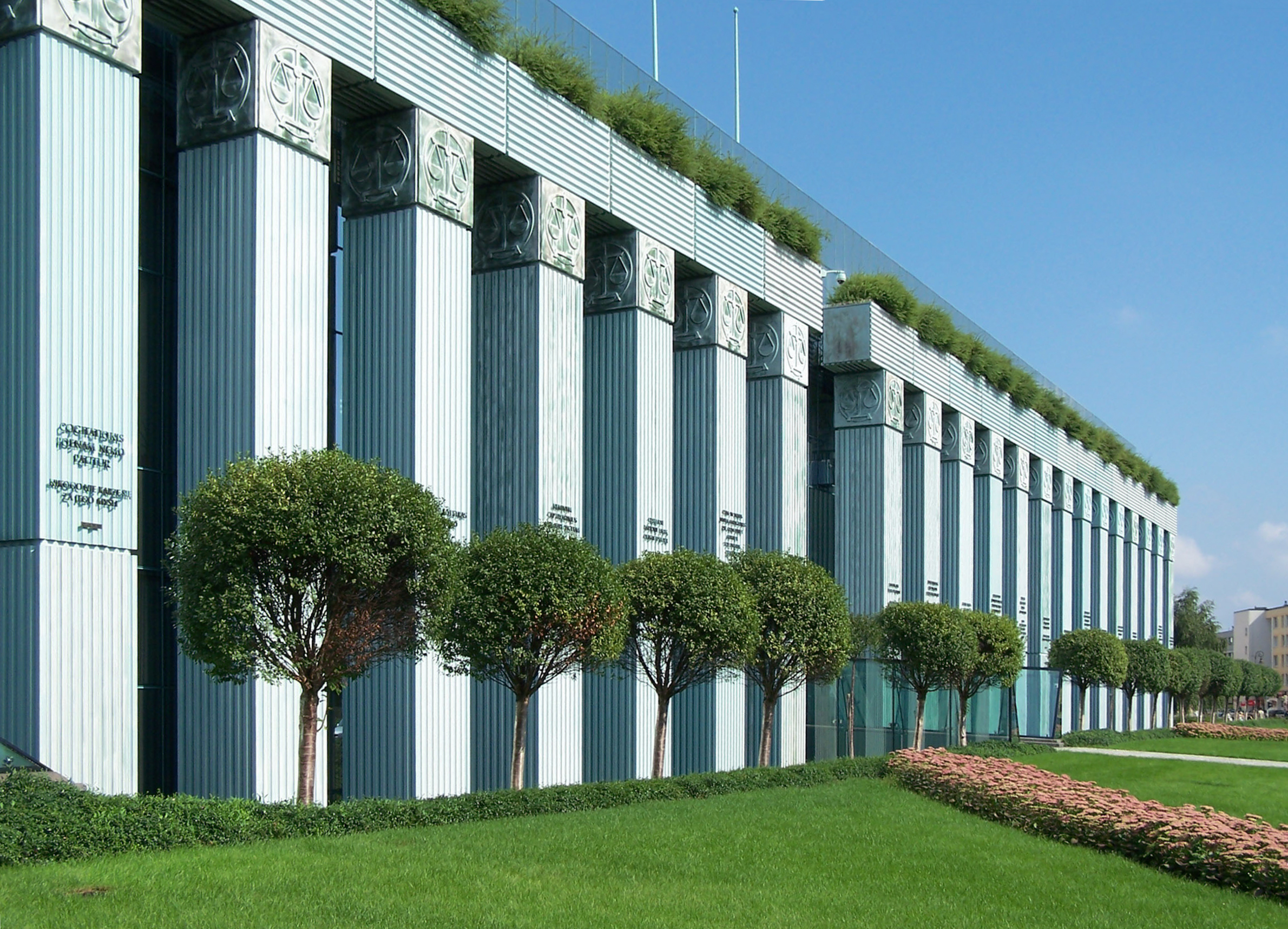|
Gabriel Czechowicz
Gabriel Czechowicz (1876-1938) was a Polish lawyer, economist and politician. He was the Polish Treasury Minister from 1926 to 1929. Accused of misuse of government funds, Czechowicz was the only Polish politician of the interwar period that faced the State Tribunal of the Republic of Poland in the so-called Czechowicz Case. The case was dropped without ruling due to pressure from the Sanacja regime. Early years Gabriel Czechowicz was born on October 2, 1876 in his family real estate near Minsk, Russian Empire, in a noble family. He graduated from Law Faculty at Saint Petersburg State University, after which took a job in a bank at Riga. In 1905, he began working for the local Russian tax chamber. In 1917, the chamber was evacuated to Tartu, and in 1918, Czechowicz returned to newly restored Poland. In 1919, he was employed by the Treasury Office of Civilian Government of the Eastern Territories. He then was manager of tax chamber in Brest. Transferred to Warsaw, in 1925 he w ... [...More Info...] [...Related Items...] OR: [Wikipedia] [Google] [Baidu] |
Minister Of Finance Of Poland
Poland's Ministry of Finance ( pl, Ministerstwo Finansów), headed by the Minister of Finance ''(Minister Finansów)'', is part of the government of Poland. Among its powers and responsibilities it drafts the national budget, deals with taxes, financing of the local self-governments and issues related to public debt. In the area of taxation, the ministry oversees a system of local and regional tax offices. A local tax office is called ''urząd skarbowy'' ("tax office"), while a higher-level office is called ''izba administracji skarbowej'' ("revenue administration regional office"). There are approximately 400 of the former throughout the country, and 16 of the latter, one in each voivodeships of Poland, voivodeship (province). In each voivodeship there is also one "customs and tax control office" ''(urząd celno-skarbowy)''. The Ministry of Finance existed alongside the Ministry of State Treasury of the Republic of Poland, Ministry of the Treasury, which was responsible mainly f ... [...More Info...] [...Related Items...] OR: [Wikipedia] [Google] [Baidu] |
Labour Faction (1937)
Stronnictwo Pracy ''( en, Labour Party)'' was a Polish Christian democratic political party, active from 1937 in the Second Polish Republic and later part of the Polish government in exile. Its founders and main activists were Wojciech Korfanty and Karol Popiel. The party continued its operations as part of the Polish Underground State during World War II (when it was code-named ''Romb''). Two politicians of the party served as heads of the Government Delegation for Poland, the civilian representatives of the Polish Underground State within occupied Poland, Cyryl Ratajski (1940–1942) and Jan Jankowski (1943–1945). The party was disbanded in 1946, with the rise of the People's Republic of Poland. Some of its members remained active in the underground until the 1950s, while others joined the Democratic Party (Poland) (''Stronnictwo Demokratyczne''), an officially sanctioned "opposition" party in communist Poland, also described as a "satellite" party of the communis ... [...More Info...] [...Related Items...] OR: [Wikipedia] [Google] [Baidu] |
Tytus Filipowicz
Tytus Filipowicz (1873–1953) was a Polish politician and diplomat. Life Filipowicz was born on 21 November 1873 in Warsaw. He attended school in Dąbrowa Górnicza. He worked as a coal miner and became a socialist political activist; from 1895 he was active in the Dąbrowa Workers' Committee. Zygmunt Woźniczka"''Ci, którzy rozsławili Dąbrowę Górniczą''" ''gazeta.pl'', 2006-11-14 He became an active member of the Polish Socialist Party (''PPS'') and editor of a socialist paper for miners (''Górnik'', Miner). In 1901 he was arrested by the authorities but escaped to Russian-ruled Warsaw. During the ''PPS'' split, he sided with the Polish Socialist Party – Revolutionary Faction and became a close collaborator of future Polish statesman Józef Piłsudski.Marek Kornat, "''Posłowie i ambasadorzy polscy w Związku Sowieckim (1921–1939 i 1941–1943)''" ("Polish Diplomatic Representatives and Ambassadors in the Soviet Union (1921–39 and 1941–43"), ''The Polish Diplo ... [...More Info...] [...Related Items...] OR: [Wikipedia] [Google] [Baidu] |
Kingdom Of Italy
The Kingdom of Italy ( it, Regno d'Italia) was a state that existed from 1861, when Victor Emmanuel II of Sardinia was proclaimed King of Italy, until 1946, when civil discontent led to an institutional referendum to abandon the monarchy and form the modern Italian Republic. The state resulted from a decades-long process, the '' Risorgimento'', of consolidating the different states of the Italian Peninsula into a single state. That process was influenced by the Savoy-led Kingdom of Sardinia, which can be considered Italy's legal predecessor state. Italy declared war on Austria in alliance with Prussia in 1866 and received the region of Veneto following their victory. Italian troops entered Rome in 1870, ending more than one thousand years of Papal temporal power. Italy entered into a Triple Alliance with the German Empire and the Austro-Hungarian Empire in 1882, following strong disagreements with France about their respective colonial expansions. Although relations wi ... [...More Info...] [...Related Items...] OR: [Wikipedia] [Google] [Baidu] |
Great Depression
The Great Depression (19291939) was an economic shock that impacted most countries across the world. It was a period of economic depression that became evident after a major fall in stock prices in the United States. The economic contagion began around September and led to the Wall Street stock market crash of October 24 (Black Thursday). It was the longest, deepest, and most widespread depression of the 20th century. Between 1929 and 1932, worldwide gross domestic product (GDP) fell by an estimated 15%. By comparison, worldwide GDP fell by less than 1% from 2008 to 2009 during the Great Recession. Some economies started to recover by the mid-1930s. However, in many countries, the negative effects of the Great Depression lasted until the beginning of World War II. Devastating effects were seen in both rich and poor countries with falling personal income, prices, tax revenues, and profits. International trade fell by more than 50%, unemployment in the U.S. rose to 23% ... [...More Info...] [...Related Items...] OR: [Wikipedia] [Google] [Baidu] |
1930 Polish Legislative Election
Parliamentary elections were held in Poland on 16 November 1930, with Senate elections held a week later on 23 November.Dieter Nohlen & Philip Stöver (2010) ''Elections in Europe: A data handbook'', p1491 In what became known as the ''Brest elections'' ( pl, Wybory brzeskie), the pro-Sanation Nonpartisan Bloc for Cooperation with the Government took 47% of the vote and 249 of the 444 seats in Sejm and 77 of the 111 seats in the Senate. The elections are known as the least free elections in the Second Polish Republic due to the Brest trial controversy. Controversy The elections were rigged by the pro-Sanacja elements in the Polish government under the control of Józef Piłsudski (although Piłsudski left most of the details of the internal politics to others). After the BBWR came up well short of a majority in the 1928 elections, Sanacja and Piłsudski left nothing to chance. The elections were supposed to take place in May, but the government invalidated the May results by d ... [...More Info...] [...Related Items...] OR: [Wikipedia] [Google] [Baidu] |
State Tribunal (Poland)
The State Tribunal () of the Republic of Poland is the judicial body, which rules on the constitutional liability of people holding the highest offices of state. It examines cases concerning the infringement of the Constitution and laws or crimes committed by the President, members of the government, the President of the Supreme Chamber of Control, the President of the National Bank of Poland, heads of central administrative offices and other senior state officials. In Poland, referral to the State Tribunal is used instead of the process of impeachment, which is traditionally used in some other nations as a way of addressing similar allegations against persons holding analogous offices. The State Tribunal is empowered to rule for the removal of individuals from public office, to impose injunctions on individuals against their appointment to senior offices, to revoke an individual's right to vote and to stand for election, to withdraw previously awarded medals, distinctions and t ... [...More Info...] [...Related Items...] OR: [Wikipedia] [Google] [Baidu] |
Sejm
The Sejm (English: , Polish: ), officially known as the Sejm of the Republic of Poland ( Polish: ''Sejm Rzeczypospolitej Polskiej''), is the lower house of the bicameral parliament of Poland. The Sejm has been the highest governing body of the Third Polish Republic since the transition of government in 1989. Along with the upper house of parliament, the Senate, it forms the national legislature in Poland known as National Assembly ( pl, Zgromadzenie Narodowe). The Sejm is composed of 460 deputies (singular ''deputowany'' or ''poseł'' – "envoy") elected every four years by a universal ballot. The Sejm is presided over by a speaker called the "Marshal of the Sejm" (''Marszałek Sejmu''). In the Kingdom of Poland, the term "''Sejm''" referred to an entire two- chamber parliament, comprising the Chamber of Deputies ( pl, Izba Poselska), the Senate and the King. It was thus a three-estate parliament. The 1573 Henrician Articles strengthened the assembly's jurisdiction, m ... [...More Info...] [...Related Items...] OR: [Wikipedia] [Google] [Baidu] |
Nonpartisan Bloc For Cooperation With The Government
The Nonpartisan Bloc for Cooperation with the Government ( pl, Bezpartyjny Blok Współpracy z Rządem, ; abbreviated ''BBWR'') was a "non-political" organization An organization or organisation (Commonwealth English; see spelling differences), is an entity—such as a company, an institution, or an association—comprising one or more people and having a particular purpose. The word is derived fro ... in the interwar Second Polish Republic, in 1928–35. It was closely affiliated with Józef Piłsudski and his Sanation movement. Its major activists included Walery Sławek, Kazimierz Bartel, Kazimierz Świtalski, Aleksander Prystor, Józef Beck, Janusz Jędrzejewicz, Wacław Jędrzejewicz, Adam Koc, Leon Kozłowski, Ignacy Matuszewski, :pl:Bogusław Miedziński, Bogusław Miedziński, Bronisław Pieracki, Adam Skwarczyński, and Janusz Radziwiłł (1880–1967), Janusz Franciszek Radziwiłł. In 1993 Lech Wałęsa, then President of Poland, founded a Nonpartisan Bloc fo ... [...More Info...] [...Related Items...] OR: [Wikipedia] [Google] [Baidu] |
National Bank Of Poland
The Narodowy Bank Polski (; the National Bank of Poland), often abbreviated to NBP, is the central bank of Poland, founded in 1945. It controls the issuing of Poland's currency, the Polish złoty. The bank is headquartered in Warsaw, and has branches in 16 major Polish cities. The NBP represents Poland in the European System of Central Banks, an EU organization. History Although the bank has existed under its current name since 1945, it is a continuation of two previous central banks, both named simply Bank of Poland (''Bank Polski''). The first one was founded in Warsaw in 1828 by Prince Franciszek Ksawery Drucki-Lubecki. An institution of the government of the Kingdom of Poland, it was entitled with issuance of the Polish currency as well as control over the credit rates. It was also entitled with a concession to operate foreign currencies and buy off credits issued by foreign companies and banks. During the Second World War the gold reserves of Poland were transferred to Rom ... [...More Info...] [...Related Items...] OR: [Wikipedia] [Google] [Baidu] |






